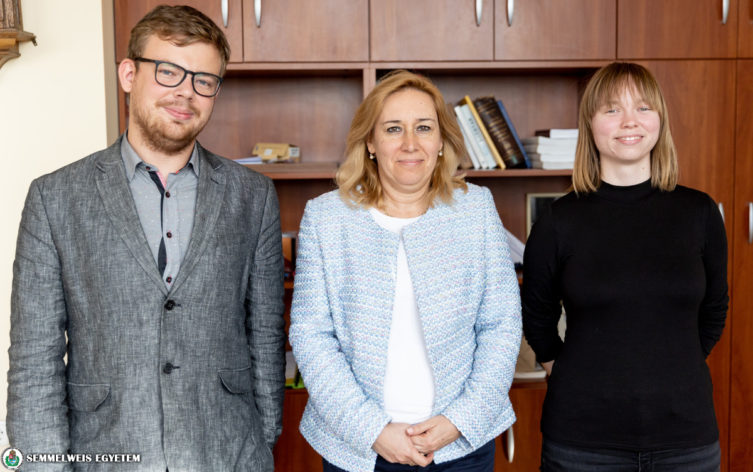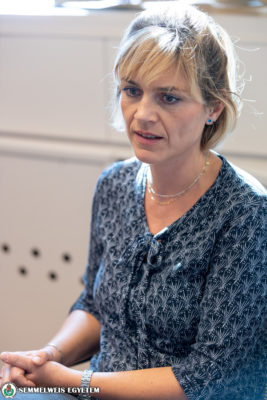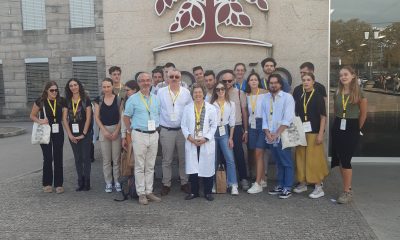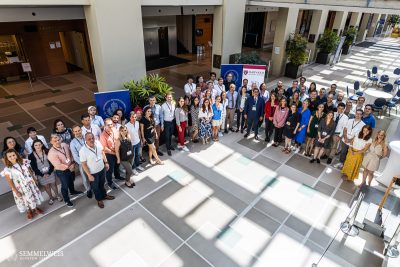“An increased number of patients develop bacteria in their bodies that are resistant to currently available antibiotics. This poses a serious problem and also a global threat. A recent report estimates that up to 50 million patients could die due to antimicrobial resistance by 2050,” – said dr. Máté Gugolya, resident at the Institute of Medical Microbiology.
The EU funded project “Strengthening antimicrobial resistance surveillance in Croatia and Hungary” is based on the cooperation of Semmelweis University and “Klinika za infektivne bolesti Dr. Fran Mihaljević”. Dr. Dóra Szabó (head of the Institute of Medical Biology) is one of the coordinators of this project representing Semmelweis University.
“We have been part of the study group of the European Society of Clinical Microbiology and Infectious Diseases (ESCMID) and have been engaged in the scientific research of antibiotic resistance. In the past few years we have collaborated with several partner institutes and decided to apply for a joint project,” said dr. Szabó.
She also added that one of the core activities of the project is knowledge transfer. Two researchers from the team had the chance to spend a month at one of the partner institutions in Mallorca studying research methodology.

An estimated 700,000 deaths are attributed to AMR every year in the world, and it is also responsible for increased morbidity and mortality rates in Hungary and Croatia. The objective of the cooperation is to strengthen the innovation capacity in AMR surveillance in both countries, focusing on whole genome sequencing and next-generation sequencing techniques. After a thorough analysis of the bacterial DNA, researchers may be able to identify bacterial resistance mechanisms.
“By analyzing the complete DNA of the bacteria, the resistance mechanisms of the bacteria can determined. For instance, an efficient targeted therapy can be determined based on the type of the carbapenemase enzyme. Choosing the wrong antibiotic medicine in such cases would lead to an unsuccessful therapy, and the further spread of antibiotic resistance,” pointed out dr. Máté Gugolya, adding that this is an incredibly expensive and time consuming process.
Semmelweis University is already equipped with a genome sequencer and the project aims to train healthcare professionals to the level of proficiency necessary to operate these machines and make its use more widespread in research and diagnostics. The project also intends to set up an ‘Antimicrobial resistance surveillance vision’.
Within the framework of this project, the Institute of Medical Microbiology of Semmelweis University cooperates with two leading facilities (University of Antwerpen’s Microbiological Laboratory and the Balearic Islands Health Research Institute) to enable knowledge transfer. The exchange of practical knowledge is facilitated by supporting educational activities and research.
An international cooperation like this may promote networking as well as the exchange of knowledge and experience. Furthermore, it will help to ensure that Hungarian scientific articles will be published in journals of high impact factor.
– emphasized dr. Máté Gugolya.
 The first annual progress report ceremony for the project was held 14-15 October in Hungary.
The first annual progress report ceremony for the project was held 14-15 October in Hungary.
The hybrid event took place in the Theoretical building at Nagyvárad Tér, where the representative of the Croatian partner institute, dr. Irina Pristaš attended in person.
“Our laboratory in Zagreb has an abundance of relevant clinical isolates required for the research progress,” said dr. Pristaš (clinical microbiologist at the University Hospital for Infectious Diseases in Zagreb).
She also added that this program hopefully will help enhance the scientific profile of the laboratory, which is functioning as part of the European Antimicrobial Resistance Surveillance Network (EARS-Net). 6-7 co-workers are also involved in the cooperation between the two universities, which is scheduled to last 3 years. During her visit in Budapest she also had consultations with the healthcare professionals of Semmelweis University on the details of their further cooperation.
“We are satisfied with our work so far. Despite last year’s coronavirus measures, we had the opportunity to share and learn a lot from each other during the first year,” summarized dr. Dóra Szabó.
Due to the pandemic last year most of the consultations and workshops were held online, but hopefully the project can get back to operating with personal meetings and conferences.
Ádám Szabó
Photo: Attila Kovács – Semmelweis University
Translation: Norbert Lukács


